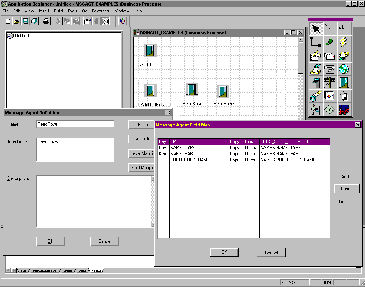
HOME | SEARCH | CONTACT | PDF FILES | WHAT'S NEW
TABLE OF CONTENTS | PREVIOUS TOPIC | NEXT TOPIC

|
BEA eLink Adapter for PeopleSoft 1.1 Information Center | |
|
HOME | SEARCH | CONTACT | PDF FILES | WHAT'S NEW |
||
|
TABLE OF CONTENTS | PREVIOUS TOPIC | NEXT TOPIC |
||
Communication with eLink Adapter for PeopleSoft is achieved through the use of FML32 buffers. This section details the creation of the FML Definition Files and configuration of the environment to allow eLink Adapter for PeopleSoft to find the FML definition files. For a complete overview of FML buffers see the TUXEDO FML Programmer's Guide provided with TUXEDO.
The eLink Adapter for PeopleSoft component maintains a one-to-one relationship between the FML field names and the field names used in the PeopleSoft Message Definitions (note this is not the record field's name, it is the name entered for the Message Definition field mapping). In order for eLink Adapter for PeopleSoft to use the FML fields there must be one or more FML Field Definition Files which must be included in the environment variable FIELDTBLS32 and located in a directory included in the environment variable FLDTBLDIR32, both of which are in the ePS.env file.
The eLink Adapter for PeopleSoft component treats all fields as being of type string. Therefore, only unique Message Definition fields names need defining - eLink Adapter for PeopleSoft does not differentiate between multiple occurrences of the same field name in different Message Definitions when passing data between one another. It is up to the system manager to determine how to maintain the FML definition files. They may be stored in one file or broken into sets of files that may, for example, correspond to the fields used for each individual Activity.
There are several ways to determine the Message Definition field names. Two of the easier ways are:
Create the FML Definition File(s)
To determine the field names that must be defined in an FML definition file using the PeopleTools Application Designer, open each Message Agent Message Definition that will be used with eLink Adapter for PeopleSoft. Inside each Message Definition in the Field Mapping section, obtain the list of field names used by that Message Definition. For example: in the PeopleSoft demonstration database the Business Process MSGAGT_EXAMPLES contains one Activity, MsgAgtExamples, which contains four Message Definitions: AddL0, AddUpdRow, ReadRow, and ReadRows. Examining the Field Mapping for the ReadRows Message Definition shows four defined fields: EMPLID, NAME_TYPE, NAME_PART, and PREFERRED_NAME. These are the fields that must be defined in an FML Definition File.
Figure 5-1 shows the list of message definition fields that must be defined in an FML definition file in order to use eLink Adapter for PeopleSoft with the message agent message definition.
The FML Definition File must contain lines similar to the following:
Figure 5-1 List of necessary message definition fields.

|
EMPLID |
900 |
string |
- |
EmployID |
|---|---|---|---|---|
|
NAME_TYPE |
901 |
string |
- |
Type of name for employee |
|
NAME_PART |
902 |
string |
- |
ID of portion of name of employee |
|
PREFERRED_NAME |
903 |
string |
- |
Preferred name of employee |
To obtain the list of fields by querying the database directly, use the following SQL query:
The selection may be modified to obtain the fields for one or a set of Activities by adding additional constraints to the "where" clause.
For example, to obtain the fields used only by the MsgAgtExamples Activity, use the following query:
select distinct C.FIELDNAME
from PSMSGAGTDEFN A, PSBUSPROCXREF B, PSMAPRECFIELD C
where B.COMPONENTNAME=A.ACTIVITYNAME
and C.ACTIVITYNAME=A.ACTIVITYNAME
order by C.FIELDNAME
select distinct C.FIELDNAME
from PSMSGAGTDEFN A, PSBUSPROCXREF B, PSMAPRECFIELD C
where B.COMPONENTNAME=A.ACTIVITYNAME
and C.ACTIVITYNAME=A.ACTIVITYNAME
and C.ACTIVITYNAME='MsgAgtExamples'
order by C.FIELDNAME